
Vivek G.Jamodkar 1, Prof N. P. Kataria 2
1 Final Year Student (M.E. Structure) , 2 Professor
Department Of Civil Engineering
Prof. Ram Meghe Institute of Technology & Research
Badnera, Amravati-444701, Maharashtra, India
vivekg.461@rediffmail.com
nkataria143@gmail.com
Geological and seismological discoveries during the 20th century have helped initiated the development of seismic building codes and earthquake resistant buildings and structures. The improvement in seismic design requirements has led to more robust, safe and reliable buildings. but in past condition ,that time was not provided base isolator from the building therefore in earthquake time many
buildings was collapse , many people were dead etc. From the knowledge of earlier studies gathered from New Madrid Fault, occurred on December
16,1811and another earthquake occurred on February 7,1812the lost and most violent earthquake occurred The Great earthquake of San Francisco, California in April 18, 1906 is noted as one of the most destructive ever recorded in North America the earthquake caused a total loss of 28,188 buildings, Underground pipe lines supplying water to the city were broken which let fires that spread over the city burn for days after the earthquake causing more damage than the earthquake itself(1). In 2001 Bhuj earthquake, various health centers were damaged. Severe damage occurred to Bhuj District hospital also. Ground shaking was felt around southern California, western Arizona and southern Nevada roughly 400 miles away Deaths were caused by the failure of critical and essential infrastructures. Several hospitals in the region collapsed or had
severe damage including the Veteran’s Administration Hospital and the newly constructed and supposedly earthquake-resistant Olive View Community Hospital. Additionally, newly constructed freeway overpasses collapsed, two dams were damaged while others receiving minor damage and some buildings subsided or caught fire. Some of the additional damage was caused by ground fracturing and landslides. In 2001 Peru Earthquake and El Salvador earthquake, several hospitals were damaged. that past studies many buildings, Dams, Pipe line, Hospitals buildings, costly materials this are seriously damages and some buildings was collapse and people were died. therefore to protect the earthquake effects/earthquake damages to the buildings and Life safety for people also important then after research are to be found out after by using Base isolator to the buildings, the base isolator are provided at the basement level to absorbing the earthquake energy or earthquake forces and safe for damages to the buildings after in all past buildings provide the base isolator. Only Functional or important buildings base isolator is provided i.e. Museum, Shopping Mall, Hospital, Factory, Dams, and Airports etc. Many countries the base isolator is provided such as India, Japan, United state of America, China etc.
Base isolation is defined as a flexible material which is provided at base to reduce the seismic forces of any structure. why base isolation is provide at the basement level because the base isolation reduces ground motion transmitted to the superstructure above the isolator, reducing the response of a typical structure and the corresponding loading(2). They are located strategically between the foundation and the building structure and are designed to lower the magnitude and frequency of seismic shock permitted to enter the building. They provide both spring and energy absorbing characteristics. Figure 1 illustrates the behavior change of structure without isolator and with isolator incorporation (3).
Structure
Many advantages of base isolation is the life is very important for human being and important equipments, materials also. The need of present study is the traditional method of providing earthquake resistant to a structure is by increasing its strength as well as energy absorbing capacity, to reduce the damage of structure by increasing relative displacement of structure when subjected to earthquake, to save the structure from earthquake ground motion and keep it to minimum hazard level. Principle of base isolation
The basic objective with seismic isolation is to introduce horizontally flexible but vertically stiff components (base isolators) at the base of a building to substantially uncouple the superstructure from high-frequency earthquake shaking. The basic concept of base isolation system is lengthening the natural period of the fixed base building. The benefits of adding a horizontally compliant system at the foundation level of a building can be seen in Figure2, (a) using an acceleration response spectrum. Increasing the period of the structure reduces the spectral acceleration for typical earthquake shaking. Displacements in isolated structures are often large and efforts are made to add energy dissipation or damping in the isolation system to reduce displacements as shown in Figure 2, (b) using a displacement response spectrum. The addition of
damping to the isolation systems serves to reduce displacements in the seismic isolators, which can translate into smaller isolators (4).
Fig 2:- Period shift effect on a) Acceleration curve b) Displacement curve
1) A flexible mounting so that the period of vibration of the building is lengthened sufficiently to reduce the force response.
2) A damper of energy dissipater so that the relative deflections across the flexible mounting can be limited to a practical design level.
3) A means of providing rigidity under low (service)
load levels such as wind and braking force.
The most common use of base isolator in building is
1. Laminated Rubber (Elastomeric) Bearing.
2. High Damping Rubber (HDR) Bearing.
3. Lead Rubber Bearing (LRB)
4. Sliding bearings
5. Friction Pendulum (FPS) System Bearing.
Laminated Rubber (Elastomeric) Bearing: It is composed of alternating layers of rubber that provide flexibility and steel reinforcing plates that provide vertical load-carrying capacity. At the top and bottom of these layers are steel laminated plates that distribute the vertical loads and transfer the shear force to the internal rubber layer. On the top and bottom of the steel laminated plate is a rubber cover that provides protection for the steel laminated, shown in figures 3 (3).
High Damping Rubber ( HDR) Bearing : It is similar to elastomeric bearings where the elastomer used ( either natural or synthetic rubber) provides a significant amount of damping The damping in the bearing is increased by adding extra-fine carbon block, oils or resins and other proprietary fillers shown in figures 3a.
Lead Rubber Bearing (LRB) : The LRB was invented in New Zealand in1975 and has been used extensively in New Zealand, Japan and United States. The steel plates in the bearing force the lead plug to deform in shear. This bearing provides an elastic restoring force and also, by selection of the appropriate size of lead plug, produces required amount of damping. The force deformation behavior of the bearing is shown in Figure3b. Performance of
LRB is maintained during repeated strong earthquakes, with proper durability and reliability.
Sliding bearings: For small vibrations, shear deformation of the rubber layers provides the same isolation effect as conventional multilayer rubber bearings. For large vibrations, sliding materials slide to provide the same deformation performance as large-scale isolation systems (3).
Friction pendulum system (FPS): Sliding friction pendulum isolation system is one type of flexible isolation system suitable for small to large-scale buildings. It combines sliding a sliding action and a restoring force by geometry. Functions of FPS are same as SSR system.
Fig.3a) High Damping Rubber (HDR) Bearing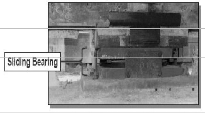
Fig.3b) Section Of Lead Rubber Bearing
Fig.3c) sliding bearing.
Pushover curve, i.e. a curve of base shear vs. top
1) Linear Static Analysis
2) Linear Response Spectrum Analysis
3) Non-Linear Static Analysis
4) Linear Time History Analysis
5) Nonlinear Time History Analysis
Linear Static Analysis :- Linear analysis methods give a good indication of elastic capacity of the structures and indicate where first yielding will occur. The linear static method of analysis is limited to small, regular buildings.
Linear Response Spectrum Analysis:- Linear response-spectrum analysis is the most common types of analysis used. This is sufficient for almost all isolation system base on LRB and / or HDR bearings.
Non-Linear Static Analysis :- In a nonlinear static analysis procedure the building model incorporates directly the nonlinear force-deformation characteristics of individual’s components and elements due to inelastic material response. Several methods (ATC40, FEMA273) existing and all have in common that the nonlinear for –deformation characteristics of the building is represented by a
displacement, obtained by subjecting the building model to monotonically increasing lateral forces or increasing displacements, distributed over the height of the building in correspondence to the first mode of vibration until the building collapses. The maximum displacements likely to be experienced during a given earthquake are determined using either highly damped or inelastic response spectra.
Linear Time History Analysis:- Linear Time History Analysis provides little more information than the response spectrum analysis for a much greater degree of effort and so is rarely used.
Nonlinear Time History Analysis:- Nonlinear Time History Analysis can be used for all isolation systems regardless of height,size,geomentry, location, and nonlinearity of the isolation system.
The design of base isolator and to calculate properties of isolater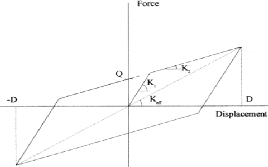
Fig 4.Parameters for bilinear modeling of isolator
e ) :-
![]()
D g
4 2
![]()
. Cvd TD
BD
e
4Q ( d![]()
dy )
2
2
2 K d
eff
(j)
K eff
W 2
![]()
g T
In fixed base structure is not design because the fixed
2
building supports is fixed and it is not a design but in
W E
2 K D
D D H
(c)
other case Base isolated building, design of base
isolator and therefore to calculate isolator properties
W E
Q D D
D D
Neglect “Dy”
4 ( )
Y
WD = 4QD (d)
by using formulae (a), (b), (c), (d), (e), (f), (g), (h), (
i), ( j). Then after firstly to calculate load on building column then this load value is put on the Standard
formulae. isolator property to calculate Effective
Q W D e
![]()
4 X D
(e)
Stiffness (Keff), Effective Damping ( ) ,Post
Q
yield stiffness (k2)& Elastic Stiffness (K1) , Yield
Strength (Q),post yield stiffness ratio(i) .Finally total
K eff
K H
![]()
K 2
D
K2 is calculate (f)
Q
value is calculated and this value will be assign for isolator in SAP-10 model. The modelling of base
isolators has been done in SAP using Joint 1 link![]()
dy
![]()
K1
{ K 2
K 1 K 2
10
}
Q
element type as rubber isolator (5).
dy
![]()
10 K 2 K 2
{ K1=10K2 } (g)
The present study has been concentrated on
7) Correction
an eight storied (G+8) buildings. The buildings
W E
Q D D
4 ( )
D D Y
Put the value DY, Then to calculate Q
value (h)
Stiffness (K1) :- K1=10K2 (i)
considered have a plan dimension of 22.4m in Length and 14.08m width of the building the plan and elevation of buildings is shown in fig. It has seven bay in the longitudinal direction and three bays in the transverse direction. The height of each story of the building is 3.3m and a column height of 1.5m has
been extended below the plinth beams. A solid slab of thickness 150mm has been considered for all storeys. As per IS: 875(Part-2)-1987, Live load intensity of 3 kN/mm2 has been assumed on each storey and the roof has been assumed a uniform live load intensity in 1.5 kN/mm2. The modeling has been performed by sap-2000 Non linear v 10.0 Software. The seismic zone is IV. Grade of concrete is M20 and for steel Fe415. The values of various factors have been assumed as per IS: 1893(Part-1) -2002. The design of members has been carried out as per IS:
456-2000 the beam and column has been design by
IS: 456-2000(5).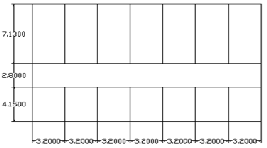
Plan
The fixed base and Base isolated building performance point is calculated by using SAP-2000 software and story drift is for EQ-X and EQ-Y direction is calculated and hinges also form to the structure.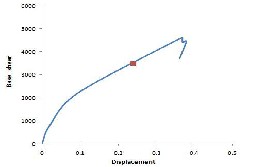
Fig 5 . Fixed base building Performance point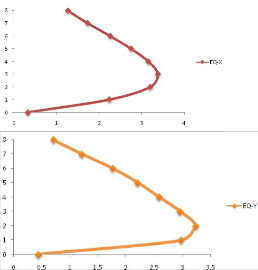
Story Drift for Fixed building (Graph 1&2 = X-axis
Story Drift &Y-axis story level)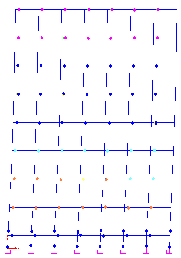
Fig 6. The hinge pattern in the longitudinal direction for the Fixed Base 8 storey building
Fig7. The hinge pattern in the transverse direction for the Fixed Base 8 storey buildings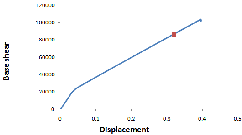
Fig 8 Base Isolated building Performance point
Story Drift for Base isolated building (Graph 4&5
=X-axis Story Drift &Y-axis story level)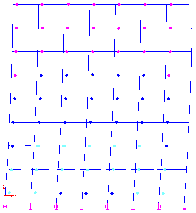
Fig9. The hinge pattern in the longitudinal direction for the Base isolated 8 storey building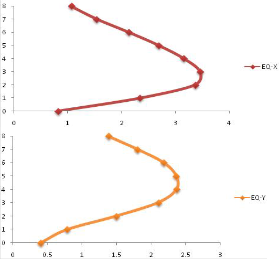

Fig10. The hinge pattern in the transverse direction for the Base isolated 8 storey buildings
In the present study, functional building has been designed to compare fixed & base isolated building, In case of fixed building performance point is observed at base shear value is less than that of base
isoalted building and displacement is fixed base building also less than base isoalted building .The present study has been concentrated on a typical plan for the 8 story buildings. The performance of the building should be studied with different plans. Their performance of base isolator is best than fixed based building, it can be used for general purposes or initial cost of structure increases tremendously. But safety it should be providing at such as hospitals, police station, & public places etc. it should be provided. It is observed that in case of fixed base building it is not possible to achieve the Intermediate occupancy and Life Safety performance level but it is possible in base isolated building. It is observed that the story drift at EQ-X direction fixed base building and base isolated building is same & story drift at EQ-Y direction fixed base building is more than base isolated building.
1)Jessica Irene wiles, Dr. Sutton F. Stephens, S.E. An overview of the technology and design of base isolated buildings in high seismic regions in the United States.
2) Refer by J.M.Ferritto
3)A. B. M. Saiful Islam*, Mohammed Jameel and Mohd Zamin Jumaat ,Seismic isolation in buildings to be a practical reality: Behavior of structure and
installation technique, Department of Civil Engineering, University of Malaya, Kuala Lumpur, Malaysia. Accepted 17 February, 2011
4) Aung Chan Win, Analysis and Design of Base Isolation for Multi-Storied Building, GMSARN International Conference on Sustainable Development: Issues and Prospects for the GMS 12-
14 Nov.2008.
5) T. K. Datta Indian Institute of Technology Delhi, India, Seismic analysis of structure.
6) IS: 456 (2000), Plain and Reinforced Concrete - Code of Practice, Bureau of Indian Standards, New Delhi.